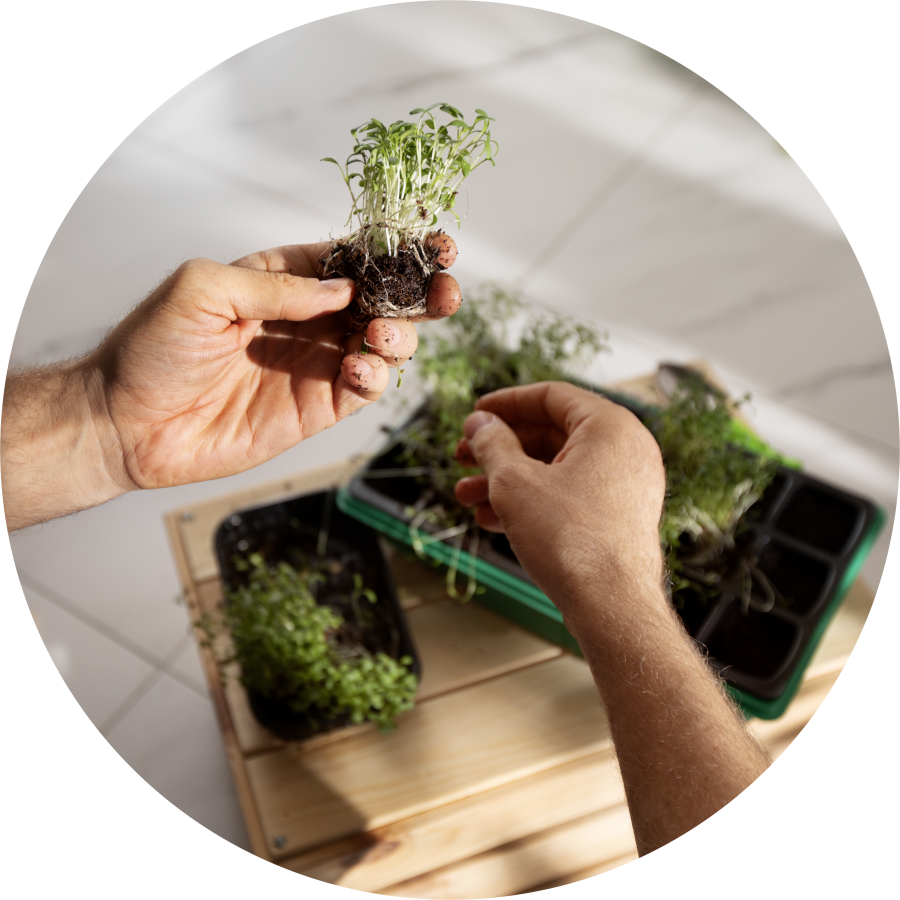Growing a microgreens business has become an attractive venture in the modern agricultural landscape. These petite plants, with their rich flavors and nutritional benefits, have carved a niche for themselves among chefs, food enthusiasts, and health-conscious individuals. However, the journey of growing a microgreens business goes beyond just sowing seeds; it’s about cultivating relationships, strategies, and adaptability.
In a recent insightful discussion series, the founder of Microacres shared invaluable lessons from their own experience in growing a microgreens business. From the significance of face-to-face interactions to the nuances of client outreach, the insights offered are a treasure trove for those embarking on this green journey. This article distills these insights, providing a comprehensive guide for those passionate about growing a microgreens business that is not only successful but also sustainable.
With a blend of practical strategies, real-world experiences, and an undeniable passion for the industry, we present a roadmap to navigate the challenges and opportunities in the world of microgreens.

Strategies for Growing a Microgreens Business Sustainably
Growing a microgreens business isn’t just about planting seeds and harvesting the greens. It’s a holistic process that requires strategic planning, market understanding, and a keen sense of customer needs. Here are some key strategies that have proven effective:
Embrace In-Person Meetings
While the digital age has brought countless tools for virtual engagement, nothing beats the impact of a face-to-face meeting. Engaging directly with potential clients, suppliers, or partners allows for a deeper understanding of their needs, fostering trust and laying the foundation for long-lasting relationships.
Harness the Power of Social Media for Growing a Microgreens Business
Platforms like Instagram and Facebook are invaluable for a microgreens business. They offer a visual medium to showcase the vibrant greens, share behind-the-scenes glimpses of the farming process, and engage with a broad audience. Regular updates, engaging content, and responsive customer interactions can elevate the brand’s presence and drive sales.
Target High-Value Prospects
Quality often trumps quantity. Instead of spreading efforts thin, it’s beneficial to identify and target high-value prospects who appreciate the quality and benefits of microgreens. These could be upscale restaurants, health-conscious cafes, or niche organic markets.
Consistent Follow-Ups
The journey from a lead to a loyal customer often requires persistence. Regular follow-ups, be it through emails, calls, or visits, can keep the business top-of-mind for potential clients. Moreover, these interactions offer opportunities to address any queries, concerns, or feedback, further solidifying the relationship.
In the end, growing a microgreens business sustainably is about intertwining agricultural best practices with strategic business acumen. It’s about viewing each plant not just as a product, but as a testament to the brand’s commitment to quality, sustainability, and customer satisfaction.

Effective Outreach and Building a Client Base when Growing a Microgreens Business
Establishing a thriving microgreens business goes beyond just producing quality greens—it’s equally about reaching out to the right audience and converting prospects into loyal clients. Effective outreach is an art, and here’s how to master it:
The Digital Footprint
In today’s digital era, a strong online presence is non-negotiable. Leveraging platforms like Instagram and Facebook not only amplifies the brand’s reach but also provides a space to visually showcase products, share customer testimonials, and engage with a global audience.
Face-to-Face Engagements
While digital platforms offer convenience, in-person meetings remain a cornerstone of effective outreach. Direct interactions, be it at farmers’ markets, food expos, or restaurant visits, provide an unparalleled opportunity to present the microgreens, answer queries in real-time, and establish a genuine connection.
Focus on Micro Clients
Growing a microgreens business isn’t always about landing the big fish. Sometimes, smaller, consistent clients—referred to as ‘micro clients’—can collectively contribute significantly to the business. They often require less management, are more loyal, and can serve as brand ambassadors through word-of-mouth marketing.
Transitioning from Initial Contact to Consistent Orders
Securing a client is just the first step. The real challenge lies in consistently meeting their needs, ensuring quality, and gradually increasing their order value. This could involve introducing them to new microgreen varieties, offering bulk purchase discounts, or collaborating on seasonal specials.
Persistence Pays when Growing a Microgreens Business
Rejection is an inevitable part of outreach. However, persistence, coupled with a genuine belief in the product, can turn potential rejections into opportunities. Regular follow-ups, listening to client feedback, and continuously refining the offering can pave the way for long-term collaborations.
Building a robust client base is a blend of strategy, persistence, and genuine passion for the product. It’s about understanding the pulse of the market, being adaptable, and, most importantly, placing the client’s needs at the heart of the business.

The Power of Simply Asking
Engaging clients and potential customers isn’t always about presenting a rehearsed pitch or showcasing an impressive catalog. Sometimes, the most impactful engagements stem from simple, genuine questions. The act of asking not only demonstrates interest but also paves the way for meaningful conversations.
Engaging with clients by posing the right questions can unearth valuable insights. For instance, inquiring about a chef’s current microgreen usage or their preferred price points can guide subsequent interactions and offerings. Such questions not only gather crucial data but also position the business as attentive and customer-centric.
Follow-ups play a pivotal role in this strategy. A timely email after a meeting, expressing gratitude for the interaction and reiterating the discussed points, can leave a lasting impression. Such gestures showcase professionalism and dedication and can go a long way toward growing a microgreens business.
Moreover, asking for feedback, be it positive or areas of improvement, can be transformative. It signals to the clients that their opinions are valued and that the business is committed to continuous improvement. Such interactions, rooted in genuine curiosity and a desire for growth, can foster trust and solidify client relationships.
In the realm of business, especially in niches like microgreens, the power of simply asking cannot be underestimated. It’s a tool that, when used judiciously, can lead to deeper connections, better offerings, and sustained growth.

Nurturing Client Relationships
When growing a microgreens business, the product is undeniably vital. Still, the relationships built around that product often determine long-term success. Cultivating and nurturing relationships is an ongoing process, and here’s how to make it fruitful:
Personal Touch in Client Interactions
A personalized approach goes a long way. Remembering client preferences, acknowledging special occasions, or simply checking in periodically can elevate a business transaction to a meaningful relationship. It’s these small gestures that make clients feel valued and appreciated.
Going Above and Beyond
Exceeding client expectations is a surefire way to stand out. This could be in the form of surprise samples, prompt responses to queries, or even occasional discounts. Such gestures might seem minor but can significantly impact client loyalty and word-of-mouth referrals.
Offering Samples and Incentives
Introducing clients to new microgreen varieties through samples can pique their interest and potentially lead to increased orders. Incentives, be it in the form of discounts for bulk purchases or rewards for referrals, can also motivate clients to engage more deeply with the business.
Engaging with the Culinary Community
Building strong relationships with chefs can be transformative. By understanding their needs, suggesting innovative uses for microgreens, or even collaborating on special dishes, a business can position itself as a valuable partner rather than just a supplier.
Feedback as a Relationship Tool while Growing a Microgreens Business
While positive feedback is always welcome, constructive criticism can be equally valuable. By actively seeking feedback and acting upon it, a business showcases its commitment to continuous improvement and client satisfaction.
In the end, nurturing relationships is about consistency, genuine engagement, and a relentless pursuit of excellence. It’s about creating an ecosystem where clients don’t just buy a product but become advocates for the brand and its values.

Building a Resilient Business Model
A sustainable and profitable venture in the world of microgreens requires more than just quality products; it demands a resilient business model. Building such a model involves a blend of foresight, adaptability, and a deep understanding of the industry’s intricacies.
Diversification is Key when Growing a Microgreens Business
Relying solely on one client type or distribution channel can be risky. Diversifying the client base, from upscale restaurants to local farmers’ markets, can provide a safety net during challenging times. Similarly, exploring various distribution channels, be it direct sales, online platforms, or partnerships, can ensure consistent revenue streams.
Financial Prudence
While growth and expansion are essential, financial prudence ensures the business remains sustainable. This means effective budgeting, regular financial audits, and setting aside reserves for unforeseen challenges. Investing in areas that directly impact product quality or customer experience can yield long-term dividends.
Continuous Learning and Innovation
The microgreens industry, like any other, evolves over time. Staying updated with the latest farming techniques, market trends, and customer preferences is crucial. Investing in research and development, attending industry workshops, or even collaborating with agricultural institutes can drive innovation.
Stakeholder Relationships
A resilient business model isn’t just about profit margins; it’s equally about the relationships built with stakeholders, from suppliers to clients. Transparent communication, fair trade practices, and a commitment to mutual growth can foster trust and long-term partnerships as you’re growing a microgreens business.
Adaptability
The ability to quickly pivot strategies in response to market changes or challenges is a hallmark of a resilient business. This requires a keen market sense, flexibility in operations, and a workforce trained to adapt.
Building a resilient business model for a microgreens venture is a continuous process. It’s about anticipating challenges, being prepared, and viewing every hurdle as an opportunity for growth and learning.

Boosting Customer Order Value and Retention
Sustaining a successful microgreens business isn’t just about acquiring new clients; it’s also about maximizing the value and loyalty of existing ones. By focusing on increasing order values and retaining customers, businesses can achieve consistent revenue growth without constantly expanding their client base.
Engage with Clients Authentically when Growing a Microgreens Business
Taking genuine interest in clients’ operations and needs can lead to increased order values. For instance, understanding a restaurant’s featured dishes and suggesting complementary microgreens can result in larger orders. Regular check-ins and updates about new microgreen varieties can also pique clients’ interest.
Strategic Upselling and Cross-Selling
Introducing clients to premium microgreens varieties or related products can lead to upselling opportunities. Cross-selling complementary products, such as specialty soils or growth kits, can also boost order values. The key is to ensure these offerings align with the client’s needs and preferences.
Loyalty Programs and Incentives
Rewarding consistent orders or referrals can incentivize clients to place larger and more frequent orders. This could be in the form of discounts, exclusive access to new products, or other perks that add value to the client’s experience.
Deliver Consistent Quality
One of the most effective ways to retain customers and encourage larger orders is by consistently delivering high-quality microgreens. Regular quality checks, investing in the best cultivation practices, and promptly addressing any concerns can ensure clients remain loyal.
Adaptable Pricing and Packages
Flexibility in pricing, especially for bulk orders or long-term contracts, can be enticing for clients. Offering tailored packages based on clients’ specific needs can also lead to increased order values.
Proactive Communication During Changes
The business landscape can be unpredictable, with challenges like supply disruptions or global events like the COVID pandemic. Proactive communication during such times, ensuring clients are updated about any changes, can foster understanding and loyalty.
By focusing on both order value and retention, microgreens businesses can achieve sustainable growth. It’s about building strong relationships, understanding clients’ evolving needs, and consistently delivering value.

Adapting to Challenges and Changes
In any business, especially one rooted in agriculture, challenges and unforeseen changes are inevitable. From climatic variations to market dynamics, a multitude of factors can influence operations. The key to sustained success lies not just in navigating these challenges but in adapting and evolving with them.
Staying Agile in Business Strategies
An agile approach allows businesses to swiftly pivot in response to changing circumstances. Whether it’s shifting to a new cultivation method due to weather disruptions or adapting marketing strategies in the face of new market trends, agility ensures the business remains resilient.
Building Strong Communication Channels
During times of change or challenges, transparent communication with stakeholders is vital. Keeping clients informed about any disruptions, be it in supply chains or delivery timelines, fosters understanding and trust. Similarly, open channels with suppliers can ensure timely adjustments and solutions.
Being Proactive while Growing a Microgreens Business
Anticipating challenges and having contingency plans in place can make a significant difference. This could involve diversifying suppliers, having backup cultivation spaces, or even financial reserves to tide over tough times.
Continuous Learning and Adaptability
The world of microgreens, like all industries, is in a state of continuous evolution. Staying updated with the latest research, market preferences, and technological advancements ensures the business remains at the forefront. This not only helps in navigating challenges but also in seizing new opportunities.
Maintaining a Positive Outlook
While strategies and plans are crucial, the mindset with which challenges are approached plays a pivotal role. Viewing challenges as learning opportunities and focusing on solutions rather than obstacles can drive innovation and growth as you’re growing a microgreens business.
In essence, adapting to challenges and changes is about being prepared, staying informed, and maintaining a solution-oriented approach. In the dynamic world of microgreens, it’s these qualities that set successful ventures apart from the rest.

Using Feedback for Continuous Improvement
Feedback, both positive and constructive, is the lifeblood of continuous improvement for any business. In the realm of microgreens, where client satisfaction directly translates to success, leveraging feedback is of paramount importance.
The Power of Listening
Actively seeking and attentively listening to client feedback can unearth invaluable insights. Whether it’s about the quality of the microgreens, the delivery process, or even the packaging, each piece of feedback offers an opportunity for refinement.
Transforming Feedback into Action
While gathering feedback is essential, the real value lies in acting upon it. Regularly reviewing feedback, identifying common themes, and implementing changes can drive tangible improvements in products and services.
Feedback as a Relationship Builder when Growing a Microgreens Business
When clients see their feedback being acknowledged and acted upon, it fosters trust and loyalty. It reinforces the idea that their opinions are valued and that the business is committed to delivering the best possible experience.
Proactive Feedback Gathering
Instead of waiting for clients to provide feedback, proactively seeking it can be beneficial. This could be in the form of regular surveys, feedback forms with deliveries, or even informal discussions during client interactions.
Continuous Improvement as a Business Philosophy
Embedding a culture of continuous improvement within the organization ensures that feedback is not just collected but is also integral to business operations. It encourages a mindset of constant refinement and evolution.
In the competitive world of growing a microgreens business, where margins can be thin and client expectations high, feedback becomes the compass guiding growth and improvement. By embracing feedback and weaving it into the fabric of business operations, microgreens ventures can achieve sustained success and client satisfaction.
Final Thoughts on Growing a Microgreens Business
The journey of growing a microgreens business is as intricate as it is rewarding. While the vibrant greens, with their burst of flavors and nutrients, are the stars, the strategies behind their cultivation and marketing are equally vital. From effective outreach to nurturing client relationships, from adapting to challenges to leveraging feedback for growth, the roadmap to success is multifaceted.
The insights shared by the founder of Microacres shed light on the nuances and intricacies of this green venture. But beyond the strategies and techniques, there lies a foundational principle – a commitment to quality, sustainability, and genuine client engagement. In the end, it’s this blend of passion, strategy, and adaptability that propels a microgreens business from a budding venture to a thriving success.
For those embarking on this journey or seeking to refine their operations, the lessons and insights shared serve as a beacon. In the world of microgreens, as in any business, continuous learning, adaptability, and a focus on relationships remain the cornerstones of sustained success.

